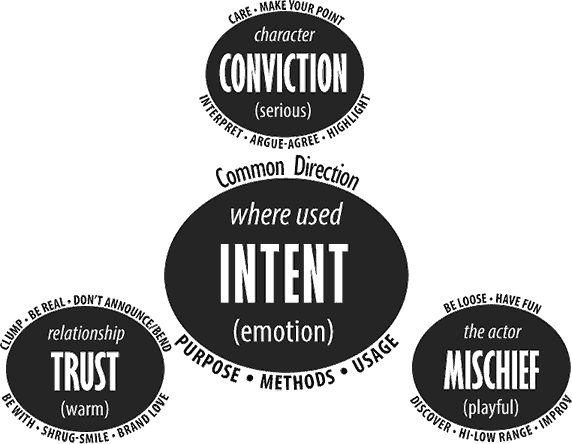Customizing Your Voiceover Acting Process
The three main skill sets are:
- Be loose.
- Connect.
- Be real.
But actors with any of these tendencies can and do perform voiceover well. The key is to start by being yourself, and find a coach who can show you how to get the most out of yourself. For example, when getting the details of information right is your thing (skilled at showing conviction), don’t try to be a better actor by being more of a party animal (skilled at being loose).
But you need each of these skills. So you need a strategy for each area. Here’s a starting point:

How to Be Loose (“Mischief”)
This is where experienced actors start their warmup, this is essential to their preparation.
Stop relying on analytical control. To do this you MUST break rules. You MUST go too far. Let the producer pull you back. Get in touch with your inner rule-breaker. Pursue party games, improv or standup comedy.
The “spirit” of preparing as an actor is the spirit of mischief. The common direction is “Go too far, let us pull you back.”
How to Socialize (“Connect”)
Once you are breaking rules and getting loose, start a little seduction. Behave playfully seductive. Relax, imagine finishing a bottle of wine in a hot tub with friends. Talk out loud to yourself. Let go. Share your most private thoughts with candor, sincerity, comfort, ingenuousness and relaxation.
How to be Real (“Conviction”)
 Three steps here. First, you have to know yourself a little bit. Modern voiceover casting is looking for people to be themselves, not play a part. To do this, first you have know which of these three areas you most identify with so you can start by being yourself.
Three steps here. First, you have to know yourself a little bit. Modern voiceover casting is looking for people to be themselves, not play a part. To do this, first you have know which of these three areas you most identify with so you can start by being yourself.
Second, you have to know: What are the convictions and objectives of the character you are being hired to play? The writer-producer-coach will play the largest part in determining this.
Finally, you must have conviction. That there is a problem worth solving, and that the solution being presented is the best must be a fact to you. This is another case where going too far is the best preparation.
If you don’t naturally have conviction, try tapping into your inner judgmental jerk. Be more harsh about what is right and wrong. Behave as if other ideas are outlandish: You alone have the facts. You’re not discussing information, opinions or beliefs. Conviction means you know you have the FACTS. Whoever disagrees is sorely mistaken. Judge them harshly. Be harsh, judgmental, fanatical.
Once you have tapped into factual conviction, your inner fanatic, you can gently suggest, or strongly state. You don’t have to sound any particular way—you can be a friendly fanatic—but you do have to know that things are black or white, fact or falsehood. Read more here about acting methods for creating conviction.
The Actor and the Producer
If the writer-producer-coach decides a character objective is to sound friendly, the actor may decide to work in the relaxing and trusting triad, and choose a method such as: smile.
We often teach talent a voice acting process along the lines of these steps:
- Learn techniques to consistently bring out your most natural voice. That is the “center” of your brand voice that you will reach from for all other styles.
- Implement actor conditioning and warmup methods. First essentials: Achieve an objective of loose playfulness.
- Determine listener-relationship objectives. First essential: Intend that you are speaking with one and only person, who is your closest friend. Speak as yourself, within your brand personality (e.g. use your actual personality).
- Determine character objectives. First essentials: Have conviction, point-of-view, and understand individual points that are made.
- Determine writer-producer objectives. First essentials: What ratio of warm-playful-serious represents the style of the spot? Which part of your brand personality should you strive for primarily? What kind of musical feeling might go with this style?
- Decide what the emotional journey is. Where are the main emotional transitions in the script? From what to what?
Here is a chart of character-listener-actor objectives and methods with more detail written below:

1. RELATIONSHIP: You Are Open and Personal with ONE Person…or it is NOT Voiceover
You are as personally close to the listener as two humans can be. You are completely comfortable together. The listener must subconsciously agree that these are their thoughts and feelings or that they are eavesdropping on a real conversation.
You may simply be relaxing or joking around; you may be boisterous or you may be intimate, but it must be obvious that you are relating and sharing, NOT teaching, preaching, training, announcing, public speaking, reading, etc., etc.
It is NOT about the information. It is about the people, relationship comfort first.
►INTENT: There is someone there. You are completely comfortable in their presence, OR you are speaking authentically to yourself. Be open, vulnerable and personal.
►TACTICS: Shrug or nod or reach towards them when you talk; make the moment before about them; imagine you are talking WITH them about others.
►DEFAULT STYLE: Warm.
► Related keywords: Open, Personal. Vulnerable. empathetic, relaxed and warm. Loving, respectful, considerate. Thoughtful, sincere.
1A It will never happen without a moment before
If you don’t feel something before you speak your words will be inaccurate, inauthentic, and easy to stumble over. Feel first or it isn’t acting, it’s recitation.
1B It will fail without natural speech
Natural speech is the process of:
- Having a thought, feeling, impulse or perception (“feel first”)
- Reacting to that thought, feeling, impulse or perception
- Putting that thought, feeling, impulse or perception into a short clump of words
- Repeating until a sentence or list is completed, then starting again.
Natural speech comes out in clumps of words. The actor does NOT hold their breath. Sounds are typically slightly extended and relaxed at the end of each clump of words. Each clump represents a micro-thought, feeling, impulse or perception.
2. CONVICTION: Believe the Stakes are(/were) High or it is NOT Commercial
You must have strong conviction. Not belief or opinion, conviction. NOT about the words of the script, but a sincere, even zealous belief that you will defend vehemently that the problem is of serious and grave importance, that the solution is essential, and an earnest, honest gratitude that the solution allows not having to live with the problem.
You can be gentle and relaxed, but conviction must underlie everything you say. We must be able to tell you have a conviction you are ready to defend.
What are you fighting for? When the spot is over, why are you so grateful the battle against the problem was won? You must know that there are topics of grave importance that you will vehemently defend if necessary. You can be zealous or opinionated, serious, sincere, earnest, certain.
►INTENT: BE someone of conviction. The script’s information is not the point—right and wrong are facts; problem, solution and gratitude are clear.
►TACTICS: Conviction is recognizing facts, not opinion. Those who disagree are ignorant. I know air and gravity; gravity holds us and air surrounds us. I am not a zealot because I have little respect for those who believe otherwise.
► Related keywords: Belief, accurate, certain, serious, earnest, of grave importance, vehement.
2A Interpretation: It is not accurate without a point of view.
Most sentences change their intent, and often their meaning, depending on how words are grouped and highlighted.
“I never said she stole my money,” has seven specific different meanings depending on which words are highlighted.
2B Transitions: It is not real without emotional flow.
Every script is an emotional journey. Feel first. Find the events, changes, summaries, responses, etc. and create flow.
2C It helps to be specific, and substitute emotions
Imagining that you are talking to a specific person that you know well in a specific location and scenario helps. Also feeling something specific from your personal experience whether directly related to what you are saying or not. Hate beer but love chocolate? Imagine chocolate when you talk about your “love” for beer. Substitute one emotion for another.
3. PLAYFUL DISCOVERY: Express a Wide, Loose Energy Range
Enjoy yourself. Bring a mischievous spirit. Feel like you are game-playing. Be loose, improvisational and playful to the point of contradicting expectations; playful troublemaking or misbehavior.
►INTENT: You are ready to break the rules. You have a sense of mischief, feel loosey-goosey and are making the words up as you go along, discovering what you say only when you say it.
►TACTICS: Always be ready with a chuckle, a wink, or a sudden drop to intimacy.
► Related keywords: Mischief. Loose, improvisational playful. Contradicting expectations; playful troublemaking or misbehavior
3A Warmup
The better the actor, the more emphasis there is is on preparation that releases and relaxes you emotionally, physically and vocally.
3B Have a personal, customized process
Each actor must know:
- The core and range of their brand personality, how others see them;
- Their primary mind-body zone (which is least distracting for you to add to your performance: More expressive (1) facial expressions and neck movements, (2) hand and arm gestures, or (3) body postures? Drive your performance from whichever is most natural: Are you more zone 1, 2 or 3? Find out!
- Their most successful acting cues at the core of their brand personality: How to help themselves consistently be themselves;
- Methods and tactics to extend from the core of their brand personality to nearby emotions;
- Personal tactics for creating discovery, transitions, and handling common directions and wildlines (e.g. change your body language before each wildline).
3C Avoid Avoiding
People avoid fears. Minds obsess over them, build walls against our fears. But fear and tension destroy your acting. Put up walls or indulge in perfectionism to avoid embarrassment and your real acting will go away. Every wall makes your inner room smaller, takes away your freedom.
Naturally relaxed and warm but embarrassed to sound seductive? Trying NOT to sound seductive will ruin your natural warmth. So your coach makes you go on the other side of your fear wall over and over again until the wall is gone. They will have you perform completely and loosely seductive until you can do it consistently and fearlessly. Then nothing will hold back your natural warmth.
Why Traditional Acting Methods Work Badly in Voice Over
Waaay oversimplified, the most common acting methods taught to achieve your character’s objectives break into two schools.
- SUBSTITUTE a FEELING MEMORY: Think of things you have personally experienced that make you feel how your character should feel, and demonstrate those feelings as your character. When your character is supposed to demonstrate a love for beer—which you hate—think chocolate…which you love. Now your character is demonstrating believable love. Strasberg-Stanislavsky-Method acting are in this category.
- INTERPRET and PERSUADE: Figure out exactly what your characters persuasion method is and exactly what points your character is trying to make. Then use body language to support you as you incite, cajole, convince, plead, ignite, level with, seduce or guilt the listener to accepting your point of view. Meisner and Practical Aesthetics are in this category.
The problem is most traditional acting has you talk to others using language natural to the time the script was written. In other words, in a real situation, interacting authentically with real people.
Voice talent don’t have that luxury. It’s hard on a voice actor’s brain that there is no one there. That you have to read the script, instead of just talking with a real person. It makes voice talent tend to sound like they are reading, because they are. You have to “undo” the reading cadence from your voice, among other challenges. You can’t easily use Meisner Method or Practical Aesthetics when there is no other actor to interact with.
And bringing up deep, authentic feelings over and over again rapidly is impossible for most actors. (And this is a common criticism of method acting approaches).
Also, voiceover producers want a variety of heightened emotional moments not for the purposes of authenticity, but to sell the product or brand.
More Tips for Becoming a Great Voice Actor
1. What’s Natural for You?
Dialogue that is easy or fun for you to do believably is the heart of your brand voice. Your brand voice—your money voice—is simply your personality.
So step #1 is to be yourself believably, then your coach will show you scene changes that will extend your acting authentically into a wider range. One talent always sounded relieved instead of serious. His coach changed his moment before language from “Thankfully…” to “Thank God…” and he immediately had greater conviction.
Your coach will have you maximize your skill at what you’re already good at. You should be able to do what you’re best at consistently. If you have an issue that holds back your natural skill, your coach will identify and have you solve that early on.
2. Believe and Care…Fanatically
Conviction is being judgmental. Not believing, but knowing you are right. So, as explained above, be fanatical that doing the wrong thing is a terrible, horrible thing. And be as calm, quirky, wise, tender, thoughtful, casual or affectionate as the script calls for in being relieved, confident, grateful, or reassured that your commercial presents the solution.
3. Talk to Your Best Friend
It’s not voice over unless you’re talking to someone you feel comfortable with. Completely comfortable. The listener should feel your comfort. That makes them trust you…and not tune you out or turn off your commercial. Whether you are loose and playful, thoughtful and warm, or assured and rational, the person you are talking to must feel your total comfort with them.
4. Be an Insanely Loose and Wacky Actor:
An actor began her performance by turning sideways to the mic, doubling over as if vomiting (!) and then laughing hysterically before standing up and reading: “I couldn’t stop laughing! I mean me…win the lottery?”
You have to be REALLY loose emotionally to act well. REALLY loose. Just shaking your arms to loosen up isn’t remotely enough. Warm up in your car before going in by getting totally crazy!
As you become a better voice actor, you’ll become better at understanding common character objectives, essentially troubleshooting your own performance before a producer needs to. You also become more skilled at choosing and implementing methods to achieve those objectives without the need for a coach’s help.
Now get out there and connect, tell the truth and have fun!

Recent Comments